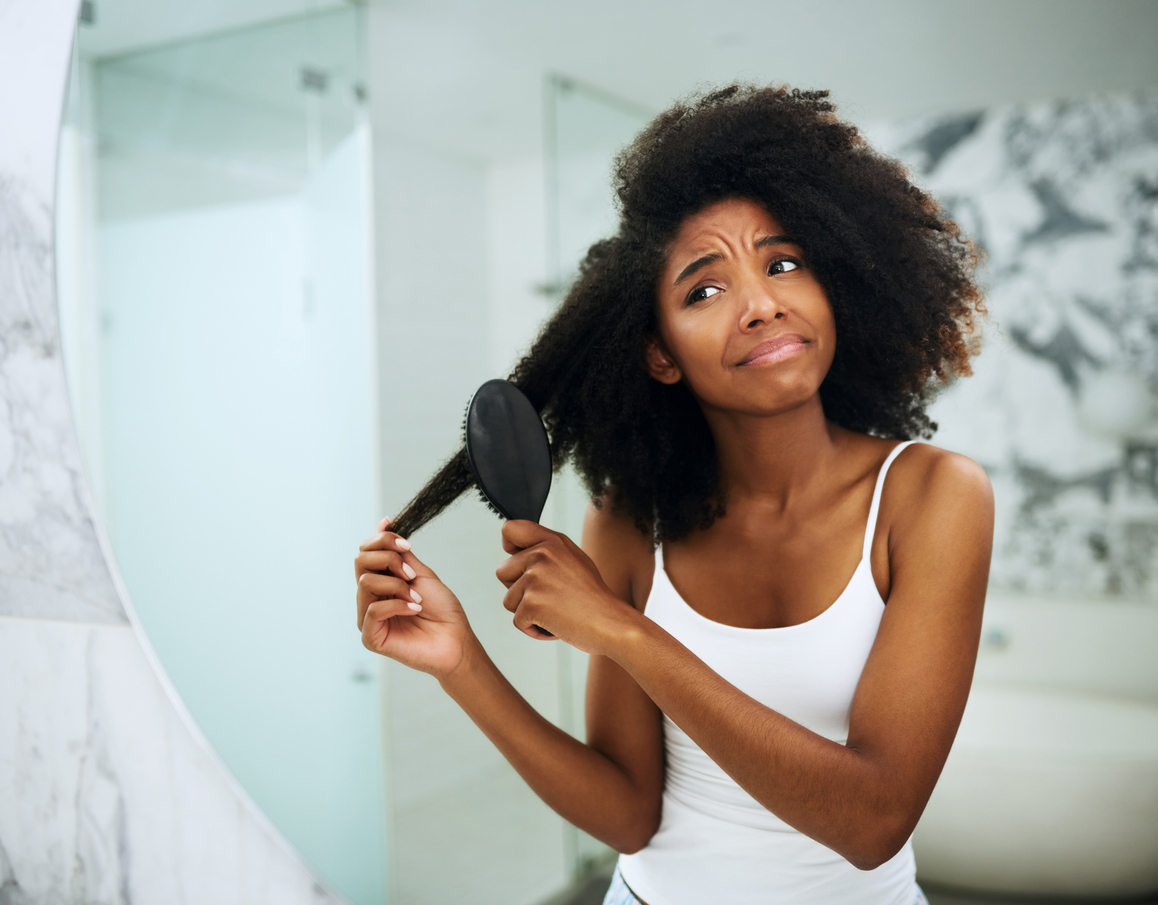
At a Glance:
What are the signs of water damage on hair?
Why does hard water damage hair?
How can I prevent hard water damage to my hair?
What is the best water softening system?
There is a lot of talk about hard vs. soft water, especially in the health and beauty space. Hard water contains many minerals that can be very rough on skin and hair.
The difference between hard and soft water is the concentration of minerals. Water that runs through a water treatment system—such as a water softener—does not have as high a concentration of minerals, which better preserves the health of hair and skin.
So, what are the signs of hard water on hair, and how do you prevent damage?
Explore Water Treatment Solutions
Learn more about the ways water softeners can help treat hard water in your home.
Water Treatment3 Signs of Hard Water on Hair
Sometimes, it’s hard to know if your water is hard or soft, and it can be difficult to tell if damage to your hair is due to the water quality or to other factors. To help identify the differences, here are three signs of hard water on hair.
1. Dry Hair
It may be a sign of hard water if your hair is overly dry, regardless of the shampoo and conditioner you use. Hard water contains minerals that create a barrier, preventing moisture from getting to the hair. Hair washed in hard water may become excessively dry, leading to other problems in the future.
2. Hair Damage and Breakage
With continued use, hard water may weaken hair strands and follicles. This means the hair will be more prone to damage and breakage. Simple haircare like everyday brushing and hairstyling (like ponytails) may cause more damage to hair that is already affected by hard water.
3. Hair Loss
The effects of hard water are not limited to the strands of your hair. In severe cases, hard water can negatively affect your scalp, leading to hair loss; however, this is a less common sign of hard water on hair alone. Hard water hair loss is more common in individuals who also experience eczema and psoriasis.
Additional Hard Water Effects on Hair
While dryness, breakage, and frizz are some of the most noticeable effects of hard water on your hair, there are other subtle yet significant issues that can arise over time. Here are a few additional effects that hard water can have on your hair:
Build-Up and Greasy Hair: Hard water contains high levels of minerals like calcium and magnesium, which can accumulate on your scalp and hair over time. This build-up creates a layer of residue that can leave your hair feeling greasy or heavy, even right after washing. This residue can also make it difficult for your hair to absorb moisture and nutrients, leading to further dryness and damage.
Flaky, Itchy Scalp: The minerals in hard water can irritate your scalp, leading to flakiness and itchiness. This irritation is often mistaken for dandruff, but it’s actually a result of mineral deposits clogging the pores on your scalp. Over time, this can cause discomfort and make your scalp more prone to infections or other skin conditions.
Reduced Hair Growth: Hard water can negatively affect your scalp’s health, which in turn impacts hair growth. The mineral build-up can block hair follicles, preventing new hair from growing as it should. This blockage can lead to thinner hair and, in severe cases, even hair loss. If you’re noticing slower hair growth or thinning, hard water might be a contributing factor.
Addressing the additional effects of hard water on hair is crucial for maintaining a healthy scalp and strong, vibrant hair. Implementing preventive measures, such as using clarifying shampoos and installing a water softener, can help mitigate these issues and protect hair from further damage.
➝ Learn More: Effects of Hard Water on Skin and How to Prevent Them
The Reason Hard Water Damages Hair
As we mentioned before, hard water contains a higher concentration of minerals. These minerals bond to hair strands, creating a barrier that deflects moisture and other substances. This film clings to the outside of the strand, making shampoos, conditioners, and other hair treatment serums ineffective.
It can also make hair dull, frizzy, stiff, and more prone to tangles. These effects are heightened when hair is washed with hard water over a long period of time. The buildup may be more difficult to penetrate with serums, masks, or other treatments.
How to Prevent Hard Water Damage to Your Hair
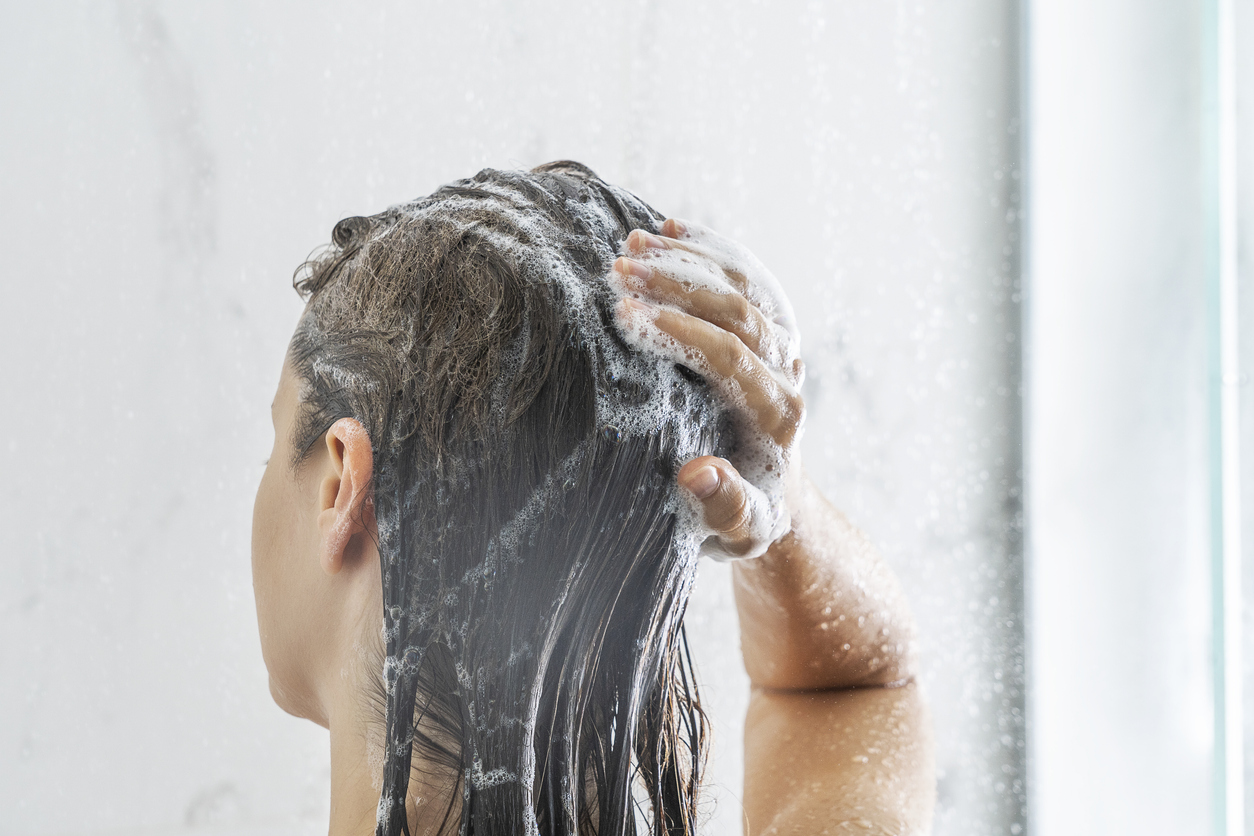
The best way to prevent hard water hair damage is to buy and install a water softener. Water softeners filter out most of the minerals that make hard water so damaging to hair. With a much smaller concentration of minerals, your hair won’t develop the water-blocking film that dries it out. Your scalp is also less likely to become irritated with soft water, further preventing issues like hair loss.
To install a water softener, you first need to select the right system for your household. There are several options in this space, differing in brand and capacity. Selecting the right size is important and depends on your water demand and, generally, your household size. A system that is not large enough to support your water demand can result in water delivery issues.
You may want to consider hiring a plumber to install your water softener properly; however, it is possible to install a water softening system yourself. If you cannot install a water softener, there are also solutions to preventing hard water damage.
4 Ways to Prevent Hard Water Damage to Your Hair:
Hard water can wreak havoc on your hair, leaving it dry, dull, and prone to breakage. Thankfully, there are simple steps you can take to protect your hair from these damaging effects.
- Install a Water Softener: A water softener removes excess minerals, protecting your hair from build-up and damage.
- Use Purifying Shampoos and Conditioners: Opt for clarifying products designed to remove mineral deposits and restore shine.
- Apply Hair Masks Regularly: Deep-condition your hair weekly with hydrating masks to combat dryness and repair damage.
- Massage Your Scalp When Shampooing: Gently massage your scalp to break up mineral build-up and promote healthier hair growth.
Our Top 3 Water Softener Picks
For a household water softener, we recommend an Envirotec model. Envirotec water softeners come in different sizes to satisfy different needs. Here are our top picks from our catalog:
- Largest Capacity: Envirotec Water Softener System ET64H
- Mid-Sized Capacity: Envirotec Water Softener System ET50HWS
- Smallest Capacity: Envirotec Water Softener System ET42H
1. Envirotec Water Softener System ET64H
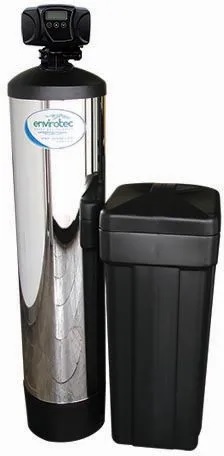
Shop Envirotec's Water Softener System ET64H
This Envirotec water softener system features a multiple-tank design, which allows for easier movement of the system for service work or relocation to a new home. It has a very large capacity of 64,000 grains. This size system regenerates the least, extending the system’s lifespan. The large capacity also eliminates hard water bleed-through, giving you a better result.
Capacity: 64,000 grains
Features:
- Highest Capacity
- Multiple Tank Design
- Regeneration Tank
- Maxflow™ Valve
- Enviroguard™
- Ultrastar™ Resin High-Temperature Resin
- Outstanding warranty
➝ Learn More: Top 3 Benefits of Salt-Free Water Softener Systems
2. Envirotec Water Softener System ET50HWS
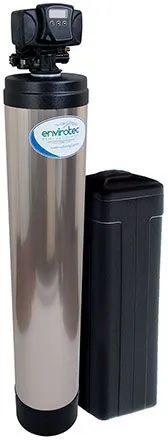
Shop Envirotec's Water Softener System ET50HWS
This water softener system from Envirotec features a new efficiency booster that knows precisely when to regenerate, saving water and salt usage up to 75 percent over conventional water softeners. The valve has excellent service flow rates for better water pressure at your showers and faucets than other systems.
Capacity: 50,000 grains
Features:
- Digital Demand Monitoring
- Superior Capacity
- Multiple Tank Design
- Regeneration Tank
- Maxflow™ Valve
- Enviroguard™
- Ultrastar™ Resin High-Temperature Resin
- No warranty compares
➝ Related: Top 5 Benefits of a Water Softener
3. Envirotec Water Softener System ET42H
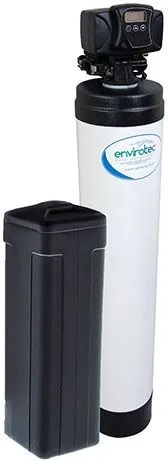
Shop Envirotec's Water Softener System ET42H
This is the smallest of our chosen Envirotec water softener systems. It is designed to handle harsh water conditions with MaxFlow, which gives the system a high flow to meet the demand.
Capacity: 42,000 grains
Features:
- Designed to handle harsh water conditions
- MaxFlow™ high flow metered demand valve
➝ Learn More: Spencer’s Fun Guide to Water Treatment Systems
Hard Water in Your Area
Do you suspect that you're experiencing hard water hair? Hard water is a growing issue across the United States. Hard water can be measured using the water hardness scale. In parts of the U.S., particularly in the Southwest, Midwest, and Northeast, hard water is common due to its prevalence in these areas' geology. The water hardness scale is a way of classifying the mineral level of water, ranging from 0 to 14 grains per gallon (GPG). Soft or slightly hard water is classified as 0-3.5 GPG, moderately hard water ranges from 3.5-7 GPG, and very hard water is considered anything above 7 GPG. While hard water is generally safe to drink, it can be a nuisance for homeowners and cause problems such as clogged pipes and limescale build-up on fixtures and appliances.
How to Tell if You Have Hard Water
The easiest way to tell if you have hard water is by using a home testing kit or checking the local water report. You can also use a water hardness test strip or drops that will display a color-coded result on the accompanying chart, which measures calcium and magnesium levels to determine your water's hardness according to the water hardness scale. The higher the level, the harder your water is considered.
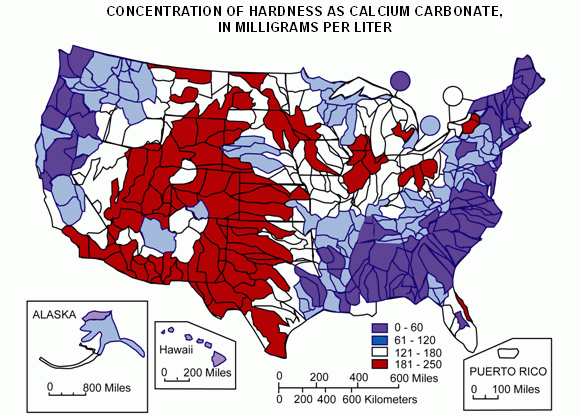
Image Credit: United States Geological Survey
➝ Learn More: Hard vs Soft Water: How They Affect You
Hard Water Hair Frequently Asked Questions
Can hard water cause hair loss?
Yes, hard water can cause scalp irritation, leading to hair loss. Mineral deposits can block nutrients from reaching hair follicles, weakening growth and potentially causing thinning or baldness. To prevent this, use treatments designed for hard water to remove build-up and restore moisture to your hair.
Is hard water bad for your hair?
A: Hard water contains more minerals than soft water, which can have adverse effects like drying and damage, leading to breakage.
How do you prevent hard water hair damage?
A: Install a water softener. The best prevention is eliminating contact with hard water altogether. Other treatments, such as clarifying shampoos, hair masks, and rinses, may also help minimize hard water damage.
How do you reverse hard water effects on hair?
A: Wash your hair with soft water. This will help rid your hair of the buildup caused by hard water. It may also help to use a clarifying shampoo, a hair mask, or a rinse, as these products can help expedite the process.
➝ Learn More: 10 FAQs on Water Treatment Systems
Why Trust Spencer’s TV & Appliance?
Since 1973, Spencer’s TV & Appliance has grown to 10 locations throughout the Phoenix Metropolitan Area. The secret to our longevity is simple: personal service. Customer satisfaction have always been the focus of our business, and throughout the years, we have been able to work hard with our suppliers to bring you the best prices. After all, getting customers the best price and personal attention is how we compete with big-box stores, day in and day out.
Not only do we offer top-rated appliances, name-brand electronics, and the best mattresses on the market but we also provide water treatment solutions and perform kitchen design services. Stop by your nearest Spencer’s and see what you’re missing!
Shop Water Softeners at Spencer’s TV & Appliance
At Spencer’s TV & Appliance, we provide high-quality, name-brand products at great prices — check out our catalog to shop water filtration systems online today. Your friends in the business are always happy to help you find the best water softener for your home. Call us, or better yet, stop by at one of our locations in the Phoenix, Scottsdale, and Glendale regions. Visit us today!
➝ Learn More: Top 11 Impurities in Contaminated Water (and How to Get Rid of Them)